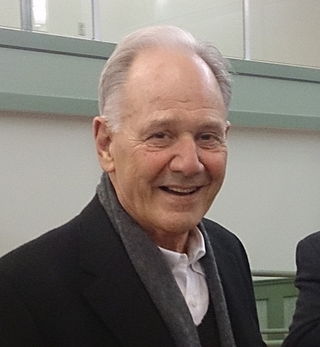Related Research Articles

Ahmed Ali was a Pakistani novelist, poet, critic, translator, diplomat and scholar. A pioneer of the modern Urdu short story, his works include the short story collections: Angarey (Embers), 1932; Hamari Gali, 1940; Qaid Khana, 1942; and Maut Se Pehle, 1945. His other writings include Twilight in Delhi (1940), his first novel in the English language.

Michel Faber is a Dutch-born writer of English-language fiction, including his 2002 novel The Crimson Petal and the White, and Under The Skin which was adapted for film by Jonathan Glazer, starring Scarlett Johansson. His novel for young adults, D: A Tale of Two Worlds, was published in 2020. His book, Listen: On Music, Sound and Us, a non-fiction work about music, came out in October 2023.
Moses "Morris" Lurie was an Australian writer of comic novels, short stories, essays, plays, and children's books. His work focused on the comic mishaps of Jewish-Australian men of Lurie's generation, who are invariably jazz fans.
Overland is an Australian literary and cultural magazine, established in 1954 and as of April 2020 published quarterly in print as well as online.

Mustansar Hussain Tarar S.I. is a Pakistani author, travel enthusiast, mountaineer, writer, novelist, columnist, TV host and former actor.

Alexander McPhee Miller is an Australian novelist. Miller is twice winner of the Miles Franklin Award, in 1993 for The Ancestor Game and in 2003 for Journey to the Stone Country. He won the overall award for the Commonwealth Writer's Prize for The Ancestor Game in 1993. He is twice winner of the New South Wales Premier's Literary Awards Christina Stead Prize for Conditions of Faith in 2001 and for Lovesong in 2011. In recognition of his impressive body of work and in particular for his novel Autumn Laing he was awarded the Melbourne Prize for Literature in 2012.

Madeleine Thien is a Canadian short story writer and novelist. The Oxford Handbook of Canadian Literature has considered her work as reflecting the increasingly trans-cultural nature of Canadian literature, exploring art, expression and politics inside Cambodia and China, as well as within diasporic East Asian communities. Thien's critically acclaimed novel, Do Not Say We Have Nothing, won the 2016 Governor General's Award for English-language fiction, the Scotiabank Giller Prize, and the Edward Stanford Travel Writing Awards for Fiction. It was shortlisted for the 2016 Man Booker Prize, the 2017 Baileys Women's Prize for Fiction, and the 2017 Rathbones Folio Prize. Her books have been translated into more than 25 languages.

Mohsin Hamid is a British Pakistani novelist, writer and brand consultant. His novels are Moth Smoke (2000), The Reluctant Fundamentalist (2007), How to Get Filthy Rich in Rising Asia (2013), Exit West (2017), and The Last White Man (2022).
Beverley Anne Farmer was an Australian novelist and short story writer.
Clement Byrne Christesen was the founder of the Australian literary magazine Meanjin. He served as the magazine's editor from 1940 until 1974.
Barry Hill is an Australian historian, writer, and academic.
Sophie Cunningham is an Australian writer and editor based in Melbourne. She is the current Chair of the Board of the Australian Society of Authors, the national peak body representing Australian authors.
This article presents a list of the historical events and publications of Australian literature during 2006.
Raza Ali Abidi is a Pakistani journalist and broadcaster who is best known for his radio documentaries on the Grand Trunk Road in Pakistan and his travelogue along the banks of Indus River. His published works include several collections of cultural essays and short stories. He has worked with the BBC Urdu Service and retired in 1996.
Maria Joan Hyland is an ex-lawyer and the author of three novels: How the Light Gets In (2004), Carry Me Down (2006) and This is How (2009). Hyland is a lecturer in creative writing in the Centre for New Writing at the University of Manchester. Carry Me Down (2006) was shortlisted for the Man Booker Prize and won the Hawthornden Prize and the Encore Prize.
John Gordon Morrison was a British-born Australian novelist and short story writer.
This article presents a list of the historical events and publications of Australian literature during 1968.

Youssef Rakha is an Egyptian writer. His work explores language and identity in the context of Cairo, and reflects connections with the Arab-Islamic canon and world literature. He has worked in many genres in both Arabic and English, and is known for his essays and poems as well as his novels.
Ali Akbar Natiq is a Pakistani poet, novelist and short-story writer. Acclaimed as one of the brightest stars in Pakistan's literary firmament, Natiq has published many books.
References
- 1 2 "Austlit — Azhar Abidi". Austlit. Retrieved 30 May 2024.
- ↑ A conversation with Azhar Abidi Archived 1 January 2009 at the Wayback Machine .
- ↑ "Melbourne Prize for Literature". Melbourne Prize Trust. Retrieved 1 November 2008.